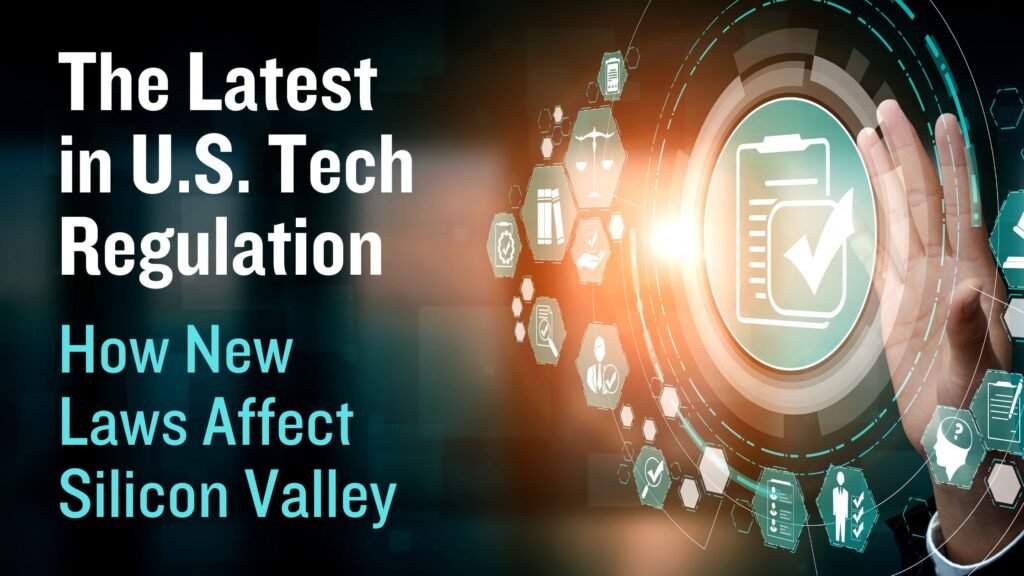US tech regulation has exploded at lightning speed, especially affecting Silicon Valley and its impact. As these technologies go about revolutionizing industries and societies, lawmakers have all the more placed focus on new laws that influence data privacy to artificial intelligence ethics. All these developments at the regulations work significantly with significant effects at Silicon Valley’s tech giants concerning growth, business models, and operational strategies. This blog delves into the most updated regulations related to tech that steer the landscape for companies in the center of the U.S. innovation hub.
The Surge in U.S. Tech Regulations in 2024
Over the past couple of years, federal and state governments have placed unprecedented pressure on Big Tech companies to get regulated. At its core lie basic problems:
- Data Privacy: Safeguarding personal data amidst common data breaches and its mishandling.
- Monopoly Power: Restoring competition to the big techs.
- AI Governance: This means controlling ethical use of AI, especially within the case of a decision.
As technology companies wield tremendous economic and social power, lawmakers are attempting to inject transparency and accountability into the sector. Several key laws enacted in 2024 have directly affected Silicon Valley-based companies.
Legislative Structure of the Sector
1. American Data Privacy Protection Act (ADPPA)
ADPPA is one of the largest federal enactments passed in the last few decades. It puts a very tough measure regarding how tech companies are supposed to manage users’ data, thus keeping American citizens more in control of their private information.
Impact in Silicon Valley
- Higher Compliance Costs: Organizations have to incur greater costs on data protection infrastructure.
- Data Use Restriction: More constraints on the way data are collected and shared.
- Fines and Penalties: Non-compliance with the ADPPA would invite hefty fines that would, in themselves, severely affect the profit margins.
Their demand will increase with a new Statista study that has discovered that the global data privacy software market is expected to grow from the $2.3 billion value in 2020 to reach a projected $15.92 billion by 2025.
2. Big Tech Antitrust Enforcement
The Federal Trade Commission (FTC) and the Department of Justice (DOJ) have started doing a lot more in enforcing antitrust in most sectors, especially against Big Tech corporations such as Google, Amazon, Apple, and Meta. In 2024, for instance, the DOJ filed several suits challenging the allegedly monopolistic conducts in the technology sector.
Factors affecting Silicon Valley
- Business Restructuring: Several technology companies will have to split off subsidiary concerns, which will affect their revenues and growths.
- Innovation Barriers: Being less concentrated, entry barriers may be lower to new startups. Meaning, there will be more innovation in the industry.
How AI Regulation is Changing the Game
Artificial Intelligence Accountability Act (AIAA)
As AI becomes a natural fit in the Silicon Valley technology landscape, the U.S. government has thrown its weight behind launching the Artificial Intelligence Accountability Act, seeking to manage the roll-out and accountability of AI development.
Key Provisions
- Algorithmic Transparency: The business would be transparent in the way its algorithms work, especially where such impact highly top-level decisions, such as hiring or loan applications.
- Bias Mitigation: The AI systems should be audited periodically against the biases such that no differentiation is based on race, gender, and class.
Implications for Tech Leaders
- Ethical AI: Development calls for transparency from these companies like Google and OpenAI that are benefiting from this cost for AI.
- Increased Scrutiny: The use of AI in companies’ decision-making process will attract legal challenge if they don’t meet the ethical standards set under the AIAA.
According to the McKinsey report, investment in AI worldwide has reached as much as $92 billion this year 2023. Though AI is surely going to bring great business opportunities, improper use might invite strict sanctions under the new regulatory regime.
Impact on Start-ups and Innovation
The innovation feed develops into smaller start-ups as a constituent part of its ecosystem. New rules will definitely create an ambivalent effect for the small technological firm-roadblock and avenue, depending upon which side it stands.
Challenges for startups
- Higher Compliance Costs: Since most startups are constraint-bound, new regulations may become difficult to comply with for them.
- Reduced Market Entry Barriers: Stricter regulations on Big Tech would create a leveled ground for entry, fairly leaving room for smaller companies.
Fresh Regulation Brings New Opportunities
- Emerging Sectors: The new areas include regulation and entry into new areas such as AI ethics and data privacy and also opening new markets in AI audit, cybersecurity, and regulatory technology, often referred to as RegTech.
- Increased Investment in Ethical Tech: More investment is already going into focusing on the growth of ethically conscious technologies. According to 2023, VC investment in AI-powered ethical tech startups has increased by 40%. (Source: TechCrunch – Investment in Ethical AI Startups)
Compliance Strategies for Tech Companies
As the scene continues changing, Silicon Valley’s tech companies need to be proactively finding their way into the regulatory environment. They do this in a lot of ways:
- Investment in Compliance Technology: Such new requirements for the higher governance of data privacy and AI will force firms into the investment of compliance technologies.
- Increased Transparency: There would be regular audits, besides publicizing the algorithmic activities, so consumer trust can be maintained.
- Diversification of Operations: Firms should diversify their revenues to cushion this potential major negative impact arising from antitrust regulations.
What’s Next? The Future of Tech Regulation
The regulatory environment that will eventually emerge is transformational, even if the future of the legislation brings many more comprehensive reforms. Some include:
- Cryptocurrency regulations: Tough laws to regulate the booming business of digital currency are on the anvil as lawmakers show interest in the growing market.
- Environmental Sustainability: As the concern for the environment grows, the carbon footprint and sustainability practice of these tech companies may require laws.
Silicon Valley Response
Companies such as Apple, Meta, and Google already begin to lobby for the soft impact of such regulations or influence future legislation. Their focus now is on such regulatory frameworks that would promote innovation rather than impede business agility.
Final Thoughts
New ways of doing business in Silicon Valley have been fostered by new waves of tech regulations placed on the U.S. Government. Laws such as ADPPA, new antitrust enforcement, and AI governance will cause a burden of greater scrutiny borne out of compliance and opportunity for businesses. Huge corporations will be on the receiving end of increased scrutiny, while smaller startups will be better positioned in this new wave of regulatory rules and regulations.
For Silicon Valley, 2024 will be a trial by fire but more importantly a chrysalis wherein rebirth can take place in a more regulated world. At this juncture, the contrasts between ethics in operations, openness and flexibility will best define companies because laggards are punished in a watched and competitive marketplace.





Leave a Reply